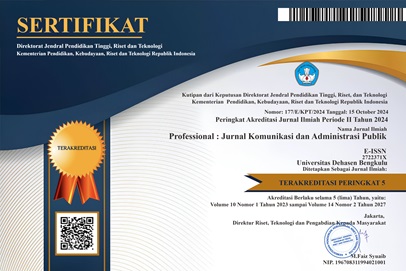STRATEGI KAMPANYE POLITIK CALON ANGGOTA LEGISLATIF INCUMBENT DEWAN PERWAKILAN RAKYAT DAERAH DALAM MENGHADAPI PEMILU LEGISLATIF 2014 (Studi Kasus Partai Golkar di Kabupaten Mukomuko)
Abstract
This research is started from the legislative election that was held simultaneously throughout Indonesia, especially in the general election of 2014, the socialization and familiarization of each candidates to the public are important to do. Political campaign conducted by politicians will certainly look different to create a certain effect on a large number of audiences. In this case, the transformation in the level of knowledge or cognition and the transformation in attitude bring sympathy and then change audiences’ behavior concretely. As seen from political points of view, new politicians and politicians who are incumbent have the same chance in winning votes in the general election. Because of that, incumbents have to prepare good strategies to win people’s hearts in the legislative election. The researcher uses a qualitative approach using a case study to describe the case researched. The supporting theory used is a symbolic interaction theory, social consideration, and concepts regarding political campaign and political communication. In this study, the researchers involves three main informants, who are Ali Saftaini, Antonius Dalle, and Husni Thamrin as members of legislative assembly running for reactivating in the legislative election from the Golkar Party consisting of the first, second, and third constituencies. The results show that (1) The team is selected by the consolidation of family relationship that is a close family having good communication in everyday life, the big family of father and mother. The party chooses a very trustworthy person having emotional closeness and maintaining communication. (2) The target election identifies targets in constituencies and establishes permanent voters, constituent for five years, as well as establishes the vote center that is the place where the voters are domiciled, developed village and the big family, and have an interest which is community organizations, farmer groups, taklim, and youth organization in constituencies. (3) The message is delivered positively and negatively and is well packed. It mainly discusses comprehensively. (4) The tactic can be divided into two: direct communication and indirect communication. Direct communication can be implemented by face-to-face communication, visiting people, and “blusukan.” Meanwhile, indirect communication can be implemented through media, newspaper, billboards, calendars, name cards, party and non-party T-shirts.
Keywords: political campaign, incumbents, legislative election



